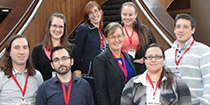Eight members of the Osgoode Indigenous Students’ Association (OISA) attended the Indigenous Bar Association’s 26th annual conference in Calgary in early October. This year’s conference focused on how Indigenous legal traditions and perspectives might enrich traditional legal education, courts and communities in Canada.
On Student Day, the day before the conference officially began, Co-Presidents Jessica George and Scott Franks shared OISA and Osgoode’s achievements and plans with the other Indigenous Student Associations across the country, and learned more about what the other law schools are doing. “Many of the ideas were very inspiring and OISA hopes to bring some to Osgoode,” Franks said. “These initiatives include ideas for Indigenous student mentoring, financing, enriched curriculum and speaker series.”
The conference featured many esteemed speakers who brought forward intriguing ideas, Franks said. The Honourable Justice Murray Sinclair, questioned the assumption that Canada should or can be enriched by Indigenous laws and customs. Lawyers David Nahwegahbow and Jean Teillet reflected on “hunting for justice” in the Canadian courts, and on the uncertainty of “wins” and “losses” in Aboriginal law.
Highly relevant to institutions like Osgoode Hall Law School, John Borrows, Jeffrey Hewitt, Tracey Lindberg, Sakej Henderson and others shared their experiences incorporating Indigenous laws, traditions, and peoples into the traditional Canadian legal education. Borrows, who teaches at the University of Victoria Faculty of Law, highlighted Osgoode’s first Anishinaabe Law Camp at Neyaashiinigmiing as an example of how Indigenous law grounds legal education and practice. All the panelists emphasized the need for sustained, critical, experiential, community and land-based Indigenous legal education.
The OISA Executive also attended workshops related to Metis treaty law, access to justice, missing and murdered Indigenous women, reclaiming Indigenous place names, northern issues, international law, and First Nations child welfare. OISA is actively sharing this experience with other members and the broader Osgoode community, Franks said.
This article was submitted by Scott Franks.
